2023届高考英语二轮复习: 代词 课件 (55张ppt)
文档属性
| 名称 | 2023届高考英语二轮复习: 代词 课件 (55张ppt) | 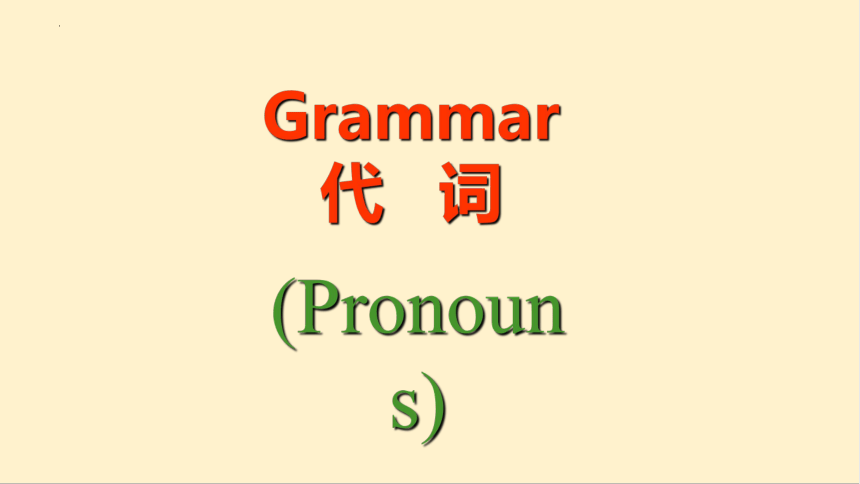 | |
| 格式 | pptx | ||
| 文件大小 | 269.2KB | ||
| 资源类型 | 教案 | ||
| 版本资源 | 通用版 | ||
| 科目 | 英语 | ||
| 更新时间 | 2023-03-13 19:41:04 | ||
图片预览

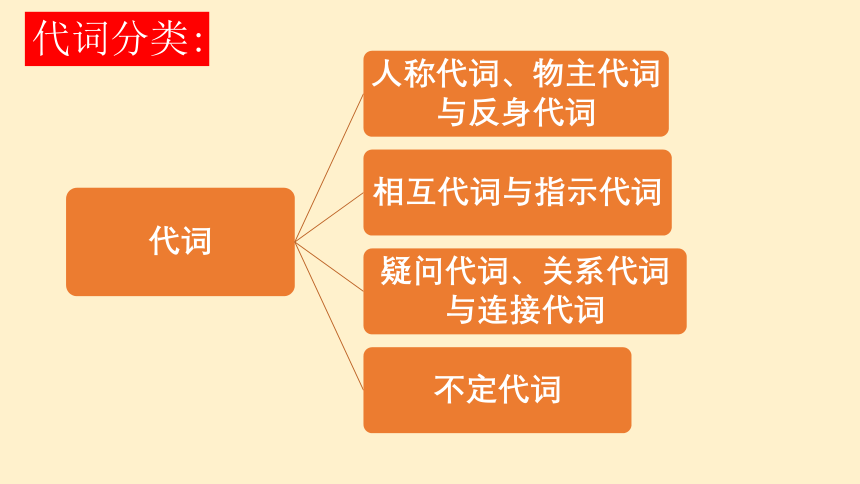
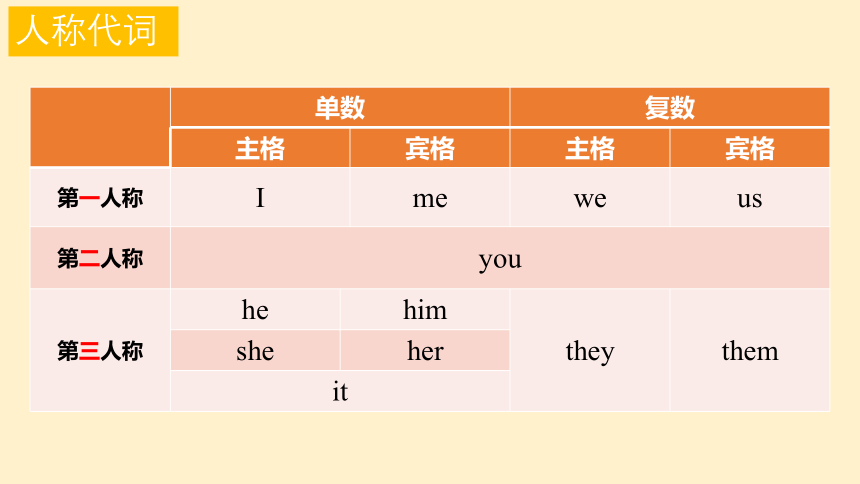
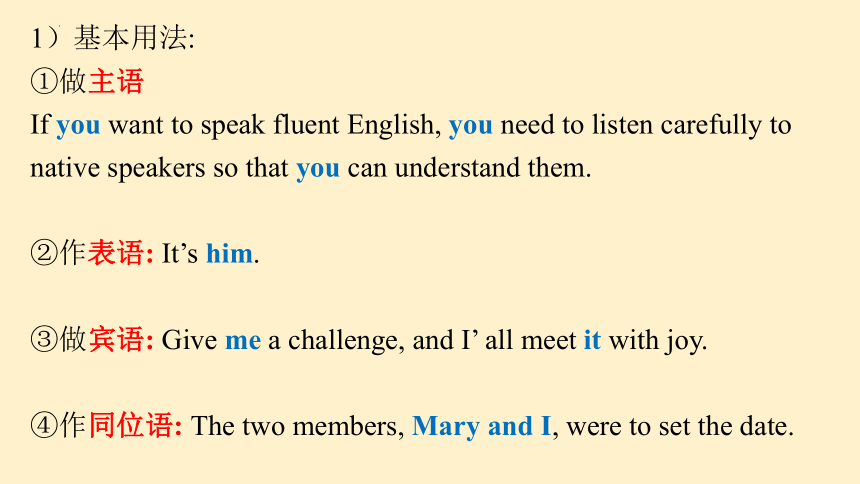
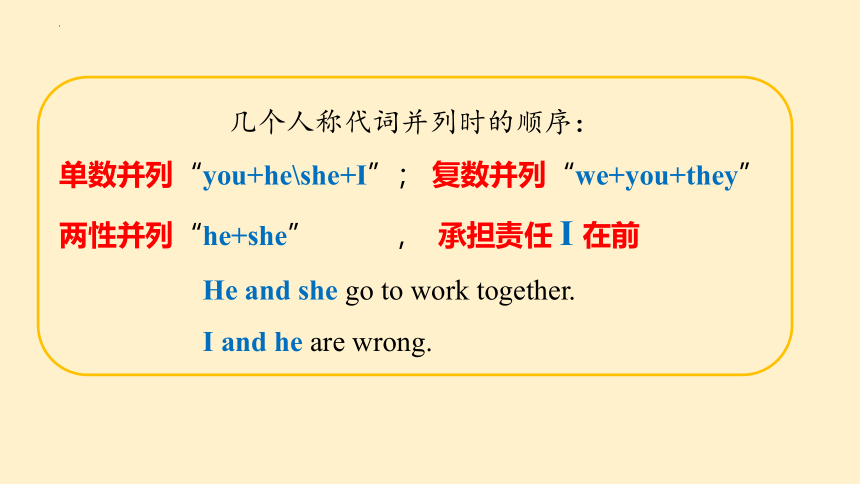
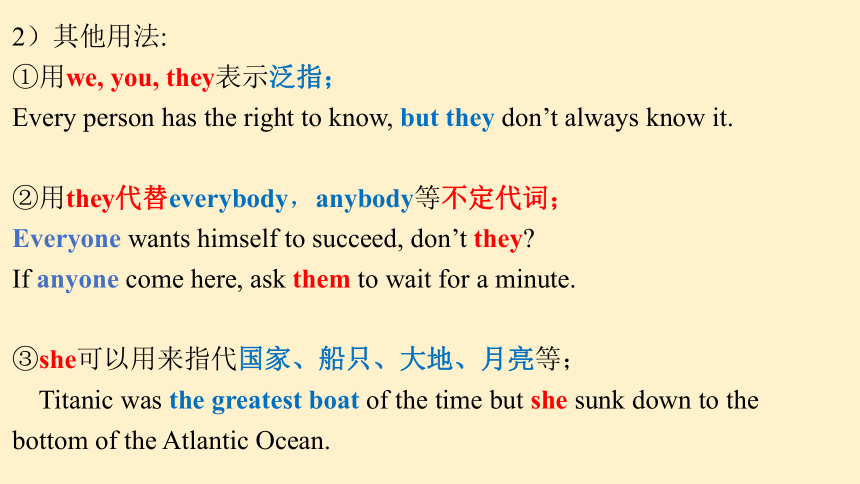
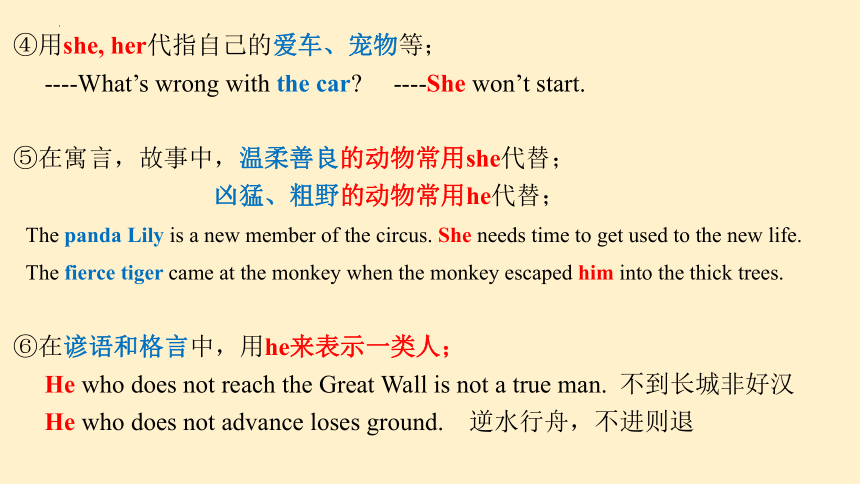
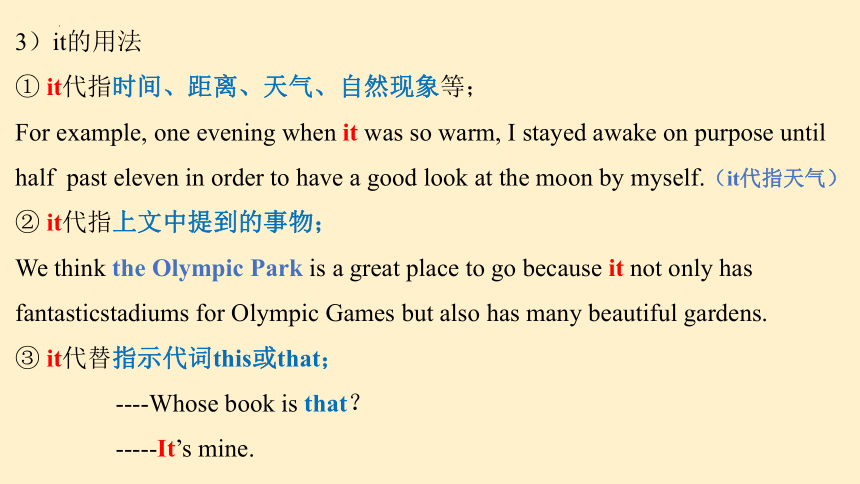
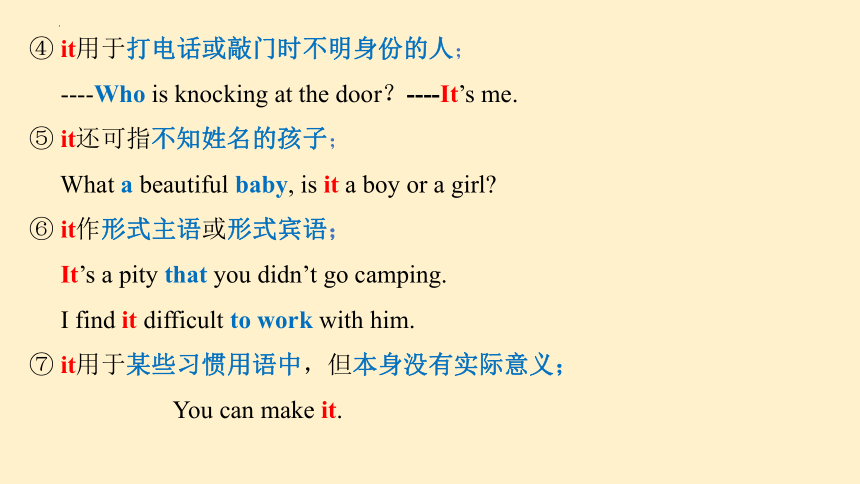
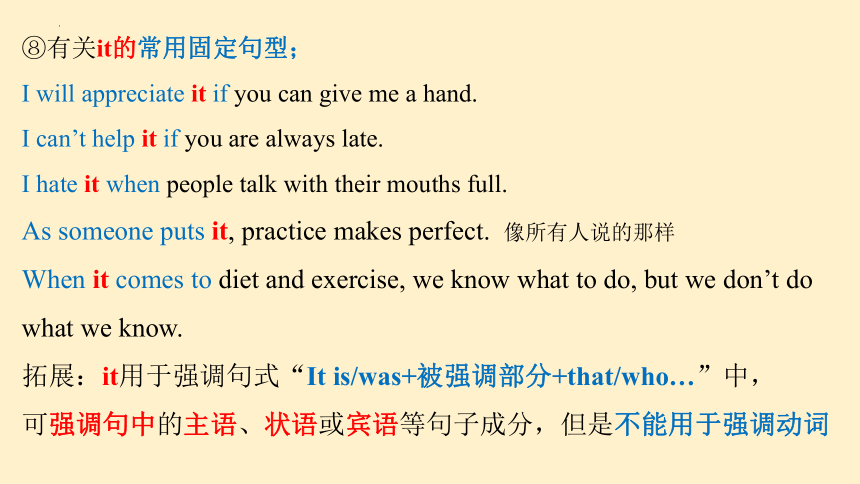
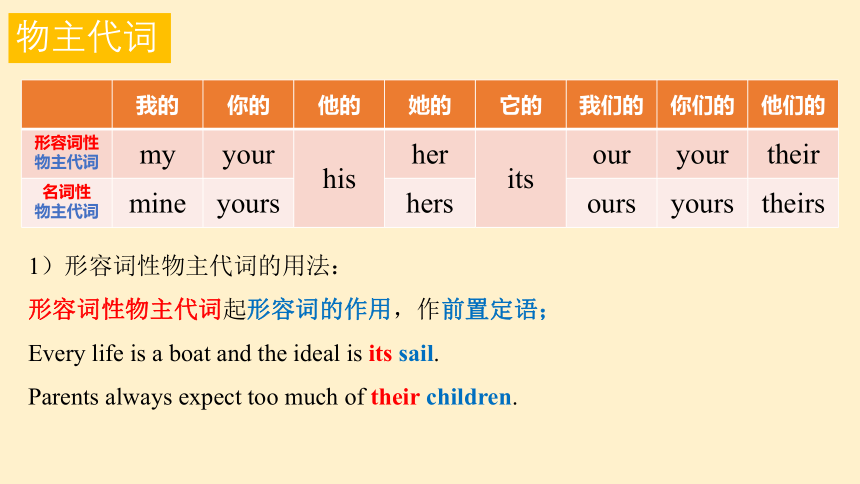
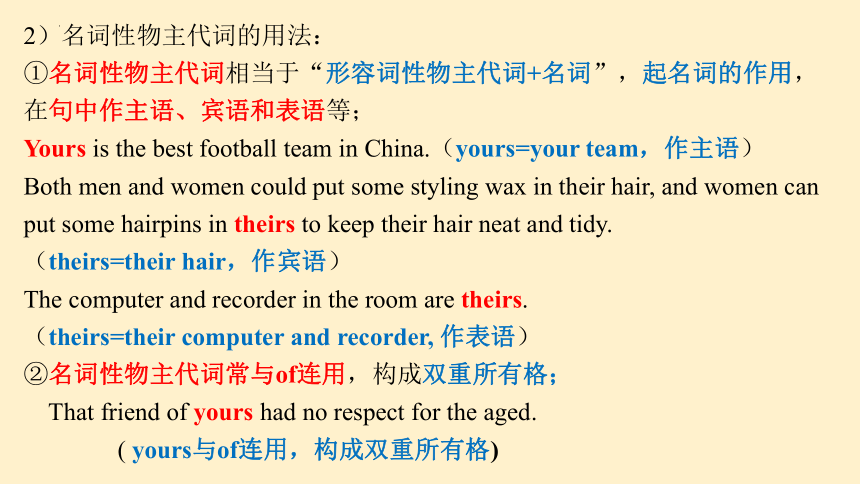
文档简介
(共55张PPT)
Grammar
代 词
(Pronouns)
代词分类:
人称代词
单数 复数 主格 宾格 主格 宾格
第一人称 I me we us
第二人称 you 第三人称 he him they them
she her it 1)基本用法:
①做主语
If you want to speak fluent English, you need to listen carefully to native speakers so that you can understand them.
②作表语: It’s him.
③做宾语: Give me a challenge, and I’ all meet it with joy.
④作同位语: The two members, Mary and I, were to set the date.
几个人称代词并列时的顺序:
单数并列“you+he\she+I”; 复数并列“we+you+they”
两性并列“he+she” , 承担责任 I 在前
He and she go to work together.
I and he are wrong.
2)其他用法:
①用we, you, they表示泛指;
Every person has the right to know, but they don’t always know it.
②用they代替everybody,anybody等不定代词;
Everyone wants himself to succeed, don’t they
If anyone come here, ask them to wait for a minute.
③she可以用来指代国家、船只、大地、月亮等;
Titanic was the greatest boat of the time but she sunk down to the bottom of the Atlantic Ocean.
④用she, her代指自己的爱车、宠物等;
----What’s wrong with the car ----She won’t start.
⑤在寓言,故事中,温柔善良的动物常用she代替;
凶猛、粗野的动物常用he代替;
The panda Lily is a new member of the circus. She needs time to get used to the new life.
The fierce tiger came at the monkey when the monkey escaped him into the thick trees.
⑥在谚语和格言中,用he来表示一类人;
He who does not reach the Great Wall is not a true man. 不到长城非好汉
He who does not advance loses ground. 逆水行舟,不进则退
3)it的用法
① it代指时间、距离、天气、自然现象等;
For example, one evening when it was so warm, I stayed awake on purpose until
half past eleven in order to have a good look at the moon by myself.(it代指天气)
② it代指上文中提到的事物;
We think the Olympic Park is a great place to go because it not only has fantasticstadiums for Olympic Games but also has many beautiful gardens.
③ it代替指示代词this或that;
----Whose book is that?
-----It’s mine.
④ it用于打电话或敲门时不明身份的人;
----Who is knocking at the door?----It’s me.
⑤ it还可指不知姓名的孩子;
What a beautiful baby, is it a boy or a girl
⑥ it作形式主语或形式宾语;
It’s a pity that you didn’t go camping.
I find it difficult to work with him.
⑦ it用于某些习惯用语中,但本身没有实际意义;
You can make it.
⑧有关it的常用固定句型;
I will appreciate it if you can give me a hand.
I can’t help it if you are always late.
I hate it when people talk with their mouths full.
As someone puts it, practice makes perfect. 像所有人说的那样
When it comes to diet and exercise, we know what to do, but we don’t do what we know.
拓展:it用于强调句式“It is/was+被强调部分+that/who…”中,
可强调句中的主语、状语或宾语等句子成分,但是不能用于强调动词
物主代词
我的 你的 他的 她的 它的 我们的 你们的 他们的
形容词性物主代词 my your his her its our your their
名词性 物主代词 mine yours hers ours yours theirs
1)形容词性物主代词的用法:
形容词性物主代词起形容词的作用,作前置定语;
Every life is a boat and the ideal is its sail.
Parents always expect too much of their children.
2)名词性物主代词的用法:
①名词性物主代词相当于“形容词性物主代词+名词”,起名词的作用,在句中作主语、宾语和表语等;
Yours is the best football team in China.(yours=your team,作主语)
Both men and women could put some styling wax in their hair, and women can put some hairpins in theirs to keep their hair neat and tidy.
(theirs=their hair,作宾语)
The computer and recorder in the room are theirs.
(theirs=their computer and recorder, 作表语)
②名词性物主代词常与of连用,构成双重所有格;
That friend of yours had no respect for the aged.
( yours与of连用,构成双重所有格)
第一人称 第二人称 第三人称
单数 myself yourself himself, herself, itself
复数 ourselves yourselves themselves
反身代词
可作宾语、表语或同位语,但不能单独作主语;
1)作及物动词或介词的宾语,表示自己承受自己发出的动作;
It’s not your fault. You shouldn’t blame yourself.
We went through a 10-meter-long passage and we found ourselves in a large burial chamber.
2)作同位语,表示强调,作“亲自、本人”解,置于名词、代词之后,也可置于句尾;
We often go to the lake after school ourselves.
The city itself should be clean and public transport ought to be convenient.
3)反身代词不能单独作主语,但有时可用在另一名词后并列作主语;
My friend and myself were invited to the party.
含有反身代词的一些固定用法:
enjoy oneself 玩的愉快 devote oneself to 献身于
behave oneself 举止得体 introduce oneself 自我介绍
teach oneself 自学 give oneself away 露出马
come to oneself 苏醒过来 by oneself 独自地
相互代词
表示两者相互关系多用each other;
表示三者及以上的相互关系时多用one another;
相互代词可在句中作宾语和定语;
1)做宾语:
Town twinning agreements encourage people from the two towns to visit each other.
In America, students and teachers are quite relaxed with each other.
2)作定语,必须在其后加-’s:
They have great concern for each other’s work.
注意:相互交流: talk to each other(√) talk each other(×)
指示代词
是用来指代或标记人或事物的代词,有this, that, these, those及such和same等;
1)this, that, these, those
①这4个词都可以代表前面提到过的事物,this和these是近指;
that和those是远指;
This is one of the most important archaeological discoveries of the 20th century.
He said, “That’s one small step for a man, one giant leap for mankind.”
②打电话时,this常用来指自己,that常用来指对方;
----Who’s that speaking?
----This is John speaking.
(that是打电话的用语,this是接电话的用语)
③有时that、 those指前面提到过的事物,this、those则指下面要讲到的事物;
I had a cold. That’s why I didn’t come.
What I want to say is this: Pronunciation is very important in learning English.
④those后可接定语从句表示一类人,在意义上相当于anyone;
Those who break the law shall be punished.
=Anyone who breaks the law shall be punished.
that在口语中的习惯用法
That’s it. 这就对了 That will do. 那就可以了
That’s life. 人生就是这样 That’s that. 情况就是这That does it! 受够了 That’s all. 就这些了
That is to say. 也就是说 That’s all right. 不用谢
归纳
2) such:
意为“这样”,在句中作主语、宾语、表语和定语;
Children should go to bed by eight o’clock. Such is my father’s opinion.
(such作主语)
The White Horse Temple is important to Chinese people and history, and as such,
it is one of the first historic buildings that the government listed to receive special state protection.(such作宾语)
There is no such thing as free lunch.(such作定语)
注意:如果修饰的名词前有不定冠词,such放在冠词前;
遇到no, one, two, another等限定词时,such必须置于其后;
3) same:
意为“同样”,与定冠词the连用,在句中作主语、表语、宾语和定语等;
The same is true of many sick and aged people.
(the same作主语)
In my mind, my hometown remains the same after all these years.
(the same作表语)
I want the same tennis racket as hers.
(the same作定语)
疑问代词
主语 宾语 表语 定语 跟of短语
指人 主格 Who √ √ √
宾格 Whom √ √
属格 Whose √ √ √ √
指物 which √ √ √ √
what √ √ √ √
分类
句法功能
1)what:
①意为“什么”,可单独使用,也可放在名词前
可以指代或修饰单复数名词;在句中作主语、宾语、表语和定语;
What makes you think I’m a lawyer (what作主语)
What kind of lifestyle do you think the people have (what作定语)
②用来询问职业,常用“what be+主语?”
和“What+助动词do+主语+do?”句式;
What is your father
What did you do before
③用来询问天气、外貌、性格等;
What’s the weather in your city this summer
What is your manager like
④“What…for?”可省略为“What for?”用来询问原因和目的;
---What do you need to borrow money for (询问原因)
---I’m going to the bookstore.
---What for?(询问目的)
---We needn’t buy books.
2)which:
在明确的、已知的范围中作出选择用which,意为“哪一个,哪一些”,
既可以指人,也可以指物;
Which of the twins got married to her (which指人)
Which city have you visited in China (which指物)
拓展:which是在特定的人或物中进行选择;
what是在未知的范围内进行选择,不局限于任何一件事或物;
注意体会二者的区别哦!
3)who、whom:
who意为“谁”,可以指单数和复数,作主语、宾语和表语;
whom在句中只能做宾语,作动词的宾语时,可用who代替;
Who was Queen Mary’s father (who作主语)
With Whom did you have lunch?(作with的宾语,只能用whom)
注意:作介词的宾语且跟在介词后时,只能用whom;
4)whose:
意为“谁的”,与物主代词一样也有形容词性和名词性之分;
Whose book is this (whose是形容词)
Whose is this book?(whose是代词)
关系代词
关系代词是用来引导定语从句的,且在从句中作主语、宾语、表语或定语,
代替从句所修饰的成分;
关系代词有that、which、who、whom、whose和as等;
The army organized teams to dig out those who were trapped and to bury the dead.
连接代词
连接代词大多数由疑问代词充当,用来引导各种名词性从句,
并在从句中充当一定的成分,主要有who,whom,whoever,what等;
不定代词
不定代词大都可以代替名词和形容词,在句中作主语、宾语、表语和定语;常用的不定代词有some, any, all, both, either, neither, each, every, other, another, much, many, few, little, one等;
1. one、 that:
1)one既可以指人又可指物,泛指同类中的任何一个;
复数形式是ones,反身代词是oneself,物主代词是one’s;
I hope there are enough glasses for each guest to have one.
(one代指任何一个杯子)
One should not live for oneself alone.
(one代表泛指,其反身代词是oneself)
注意:one不能代指不可数名词
2)that代指的是同一类事物,表示特指;
No bread eaten by man is so sweet as that earned by his own labor. (that后有过去分词短语修饰,表示特指)
The winter in Beijing is very cold while that of Kunming is warm.(用that代替winter,避免重复)
2.no、none、no one:
1)no是形容词性的不定代词,只能用作定语,修饰可数和不可数名词;
no相当于not a或not any;
I have no money in the bag.
=I have not any money in the bag.
2)none是名词性不定代词,既可指人也可指物,常和of短语连用;
None of us is/are perfect.
None of the money is mine.
注意:none作主语代替不可数名词时,谓语动词用单数形式;
代替可数名词时, 谓语动词用单、复数均可;
3)none与all相对,有“全不”的含义,
因此none是all的全部否定,指三者以上的人或物;
We all made mistakes.
=None of us was correct.
4)no one相当于nobody,只能指人,其后不可接of短语,谓语动词用单数;
No one helped me;no, not a single person.
5)none常用来回答how many, how much引导的疑问句;
no one用来回答who引导的疑问句;
----How much money do you have
----None.
----Who is in the classroom
-----No one.
3. each、every:
each强调个体,可作主语、宾语、定语和同位语,其后可跟of短语;
Each boy has a dictionary.
every相当于all,强调整体,只能作定语,其后不能跟of短语;
Every boy has a dictionary.
注意:every还意为“每隔”
every other day 每隔一天 every five days
4.some、any:
1)some和any都表示“一些”,用作主语、宾语、表语等;
some多用于肯定句中,any多用于否定句和疑问句中;
Some teachers, with their performance-related pay, may also gain.
2)some用于表示请求的疑问句中,希望得到肯定的答复;
----Would you like some tea
3)some还可以表示“某一”,修饰单数可数名词;
There must be some reason for what she’s done.
4)any也可用于肯定句中,表示“任何一个,任何一些”;
One kiss is usual for the older generation ,two acceptable for young people, but three is excessive for any age.
5)some/any of…作主语时,谓语动词的数由of后的名词而定;
Some of the food has gone bad.
I don’t think any of them are coming.
5.both、either、neither:
1)both表示“两个都”,只能用于两者之间,起名词和形容词的作用;
它在句中可以作主语、宾语、定语、同位语等,作主语时谓语动词用复数;Both of them are talented.(both作主语)
You can take either of the two, but not both.(both作宾语)
I treated both parties equally.(both作定语)
注意:both,all,every和not连用表示部分否定
2)either表示“两者中任何一个”,作主语时谓语动词用单数;
-----Would you prefer tea or coffee
-----Oh, I don’t mind. Either will do.
3)neither是either的否定形式,意为“两者都不”,用法同either;
Is your partner a “couch potato”, a “workaholic” or neither
He could answer neither of the questions.
高频考点:
当neither…nor, either…or连接两个主语时,谓语动词遵循就近原则;
Neither you nor he is wrong.
=Neither he nor you are wrong.
6.other、the other、another、others、the others:
other, another和others表泛指;
the other和the others表特指;
But other students have started gossiping.
One is popcorn, the other is cigarette.
Later,it invented another holiday on 2 November, All Souls’ Day, to honor dead people.
Courage is the quality which guarantees all others.
Three of us remain here and all the others go shopping.
one……another 一个,另一个
one……the other 两者中一个是one,另一个是other
one……the others 多数中的一个,其余全部
some……the others 和其余的全部
some……others 一些和余下的一部分
7. few、a few、little、a little
肯定 a few (一些) a little (有点儿)
否定 few (几乎没有) little (几乎没有)
修饰语 修饰 cn.(复数) 修饰un. 或 抽象名词
I have a few friends in the city.
I can only speak a little French.
拓展:修饰un.时,a little后直接+n.;
a bit后需+of,再+n.;
not a little意为“很,非常”;
not a bit意为“一点儿也不”
a little water = a bit of water
He is not a little angry.
He is not a bit angry.
8.复合不定代词
-one -body -thing
some- someone somebody something
any- anyone anybody anything
every- everyone everybody everything
no- no one/none nobody nothing
前缀
后缀
some-类复合不定代词主要用于肯定句;
any-类复合不定代词主要用于否定句、疑问句和条件句;
some-类复合不定代词用于疑问句时,表示希望得到对方肯定的回答;
any-类复合不定代词用于疑问句时,表示“任何”之意;
Does someone here know Lily’s telephone number I haven’t seen anybody around here that I can turn to for help.
Nothing in the world is difficult for one who sets his mind to do it.
归纳:
1)复合不定代词作主语时,谓语动词一般用单数形式;
2)形容词修饰复合不定代词时,必须置于其后;
练习巩固
选择填空
1.There are several pretty girls standing under the tree, but ______ are known to me.
A. neither B. none C. no one D. all
2.In one year rats eat 40 to 50 times ______ weight.
A. its B. and C. their D. theirs
3.You’d better continue to use the same spelling of your name as ______ you used in your application.
A. one B. the one C. any D. some one
4.The little baby was left alone, with ______ to look after it.
A. someone B. anyone C. not one D. no one
5.John can play chess better than ______ else.
A. the one B. no one C. any one D. another
B
C
B
D
C
6.The weight of something is another way of describing the amount of force exerted on ______ by gravity.
A. it B. them C. that D. one
7.It is one thing to enjoy listening to good music, but it is quite ______ to perform skillfully yourself.
A. other B. another C. some D. any
8.Children should be taught how to get along with ______.
A. another B. other C. others D. any other
9.The poor man lived on wild berries and roots because they had ______ to eat.
A. nothing else B. anything else
C. something other D. nothing other
A
B
C
A
10.One of the properties of light is ______ traveling in wave form as it goes from one place to another.
A. it B. it’s C. its D. their
11._____in the world has been asked to do his duty for the human society.
A. Each of the tramps B. Every of the tramps
C. The each tramp D. The every tramp
12.In some restaurants, food and service are worse than ____used to be.
A. they B. it C. them D. that
13.Let the porter take all the baggage out and put ______ in the lobby.
A. it B. they C. them D. its
14.Everyone who comes to the party is given a wooden apple with _____ own names cut in it as a souvenir.
A. his B. her C. their D. our
C
A
C
A
A
15.Everybody in the class must give in ______ exercise book within the given time.
A. their B. our C. his D. her
16.During the journey, the boys and girls entertained ______ with songs and games.
A. themselves B. their selves C. himself D. itself
17.You’d better buy ______ some fruits when you go on a trip.
A. youself B. myself C. yourself D. you
18.The boys in this town like to bully ______.
A. one another B. one and other C. each other D. one and the other
19.One common family name is Black,______ is Anderson.
A. another B. the other C. others D. none other
A
A
C
A
A
20.I bite my nails. I must break ______.
A. the habit of me B. the habit with myself
C. myself of the habit D. of the habit myself
21.______ of them shared my opinions, so we have ______ in common to discuss.
A. Nobody/a little B. Few/little C. A few/little D. None/many
22.When science, business and art learn something of ______ methods and goals, the world will have come closer to cultural harmony.
A. one and the other’s B. each and the other’s
C. one another’s D. the one’s and the other’s
23.The boy is ______ of a musician.
A. anyone B. anything C. someone D. something
24.For ______ interested in nature, the club offers hikes and overnight camping each week during the summer.
A. them B. whom C. themselves D. those
C
B
C
D
D
翻译词组
enjoy oneself 献身于
behave oneself 自我介绍
teach oneself 露出马脚
come to oneself 独自地
enjoy oneself 玩的愉快 献身于 devote oneself to
behave oneself 举止得体 自我介绍 introduce oneself
teach oneself 自学 露出马脚 give oneself away
come to oneself 苏醒过来 独自地 by oneself
翻译句子
1.如果想讲一口流利的英语,就需要认真地听母语是英语的人说话,这样你才能理解。
2.让我迎接挑战,我会欣然受之。
3.不到长城非好汉。
4.逆水行舟,不进则退。
1.如果想讲一口流利的英语,就需要认真地听母语是英语的人说话,这样你才能理解。
If you want to speak fluent English, you need to listen carefully to native speakers so that you can understand them.
2.让我迎接挑战,我会欣然受之。
Give me a challenge, and I’ all meet it with joy.
3.不到长城非好汉。
He who does not reach the Great Wall is not a true man.
4.逆水行舟,不进则退。
He who does not advance loses ground.
5.当提到饮食和运动的时候,我们都知道怎么去做,但是不会按照我们知道的去做。
6. 如果您能助我一臂之力,我将不胜感激。
7.像所有人说的那样,熟能生巧。
8.每个人生都是一只船,理想是船帆。
5.当提到饮食和运动的时候,我们都知道怎么去做,但是不会按照我们知道的去做。
When it comes to diet and exercise, we know what to do, but we don’t do what we know.
6. 如果您能助我一臂之力,我将不胜感激。
I will appreciate it if you can give me a hand.
7.像所有人说的那样,熟能生巧。
As someone puts it, practice makes perfect.
8.每个人生都是一只船,理想是船帆。
Every life is a boat and the ideal is its sail.
9.我发现与他一起工作很难。
10.这是20世纪最重要的考古发现之一。
11.解放军组成的小分队,将受困的人们挖出来,将死者掩埋。
12.世上无难事,只怕有心人。
9.我发现与他一起工作很难。
I find it difficult to work with him.
10.这是20世纪最重要的考古发现之一。
This is one of the most important archaeological discoveries of the 20th century.
11.解放军组成的小分队,将受困的人们挖出来,将死者掩埋。
The army organized teams to dig out those who were trapped and to bury the dead.
12.世上无难事,只怕有心人。
Nothing in the world is difficult for one who sets his mind to do it.
Thank you
Grammar
代 词
(Pronouns)
代词分类:
人称代词
单数 复数 主格 宾格 主格 宾格
第一人称 I me we us
第二人称 you 第三人称 he him they them
she her it 1)基本用法:
①做主语
If you want to speak fluent English, you need to listen carefully to native speakers so that you can understand them.
②作表语: It’s him.
③做宾语: Give me a challenge, and I’ all meet it with joy.
④作同位语: The two members, Mary and I, were to set the date.
几个人称代词并列时的顺序:
单数并列“you+he\she+I”; 复数并列“we+you+they”
两性并列“he+she” , 承担责任 I 在前
He and she go to work together.
I and he are wrong.
2)其他用法:
①用we, you, they表示泛指;
Every person has the right to know, but they don’t always know it.
②用they代替everybody,anybody等不定代词;
Everyone wants himself to succeed, don’t they
If anyone come here, ask them to wait for a minute.
③she可以用来指代国家、船只、大地、月亮等;
Titanic was the greatest boat of the time but she sunk down to the bottom of the Atlantic Ocean.
④用she, her代指自己的爱车、宠物等;
----What’s wrong with the car ----She won’t start.
⑤在寓言,故事中,温柔善良的动物常用she代替;
凶猛、粗野的动物常用he代替;
The panda Lily is a new member of the circus. She needs time to get used to the new life.
The fierce tiger came at the monkey when the monkey escaped him into the thick trees.
⑥在谚语和格言中,用he来表示一类人;
He who does not reach the Great Wall is not a true man. 不到长城非好汉
He who does not advance loses ground. 逆水行舟,不进则退
3)it的用法
① it代指时间、距离、天气、自然现象等;
For example, one evening when it was so warm, I stayed awake on purpose until
half past eleven in order to have a good look at the moon by myself.(it代指天气)
② it代指上文中提到的事物;
We think the Olympic Park is a great place to go because it not only has fantasticstadiums for Olympic Games but also has many beautiful gardens.
③ it代替指示代词this或that;
----Whose book is that?
-----It’s mine.
④ it用于打电话或敲门时不明身份的人;
----Who is knocking at the door?----It’s me.
⑤ it还可指不知姓名的孩子;
What a beautiful baby, is it a boy or a girl
⑥ it作形式主语或形式宾语;
It’s a pity that you didn’t go camping.
I find it difficult to work with him.
⑦ it用于某些习惯用语中,但本身没有实际意义;
You can make it.
⑧有关it的常用固定句型;
I will appreciate it if you can give me a hand.
I can’t help it if you are always late.
I hate it when people talk with their mouths full.
As someone puts it, practice makes perfect. 像所有人说的那样
When it comes to diet and exercise, we know what to do, but we don’t do what we know.
拓展:it用于强调句式“It is/was+被强调部分+that/who…”中,
可强调句中的主语、状语或宾语等句子成分,但是不能用于强调动词
物主代词
我的 你的 他的 她的 它的 我们的 你们的 他们的
形容词性物主代词 my your his her its our your their
名词性 物主代词 mine yours hers ours yours theirs
1)形容词性物主代词的用法:
形容词性物主代词起形容词的作用,作前置定语;
Every life is a boat and the ideal is its sail.
Parents always expect too much of their children.
2)名词性物主代词的用法:
①名词性物主代词相当于“形容词性物主代词+名词”,起名词的作用,在句中作主语、宾语和表语等;
Yours is the best football team in China.(yours=your team,作主语)
Both men and women could put some styling wax in their hair, and women can put some hairpins in theirs to keep their hair neat and tidy.
(theirs=their hair,作宾语)
The computer and recorder in the room are theirs.
(theirs=their computer and recorder, 作表语)
②名词性物主代词常与of连用,构成双重所有格;
That friend of yours had no respect for the aged.
( yours与of连用,构成双重所有格)
第一人称 第二人称 第三人称
单数 myself yourself himself, herself, itself
复数 ourselves yourselves themselves
反身代词
可作宾语、表语或同位语,但不能单独作主语;
1)作及物动词或介词的宾语,表示自己承受自己发出的动作;
It’s not your fault. You shouldn’t blame yourself.
We went through a 10-meter-long passage and we found ourselves in a large burial chamber.
2)作同位语,表示强调,作“亲自、本人”解,置于名词、代词之后,也可置于句尾;
We often go to the lake after school ourselves.
The city itself should be clean and public transport ought to be convenient.
3)反身代词不能单独作主语,但有时可用在另一名词后并列作主语;
My friend and myself were invited to the party.
含有反身代词的一些固定用法:
enjoy oneself 玩的愉快 devote oneself to 献身于
behave oneself 举止得体 introduce oneself 自我介绍
teach oneself 自学 give oneself away 露出马
come to oneself 苏醒过来 by oneself 独自地
相互代词
表示两者相互关系多用each other;
表示三者及以上的相互关系时多用one another;
相互代词可在句中作宾语和定语;
1)做宾语:
Town twinning agreements encourage people from the two towns to visit each other.
In America, students and teachers are quite relaxed with each other.
2)作定语,必须在其后加-’s:
They have great concern for each other’s work.
注意:相互交流: talk to each other(√) talk each other(×)
指示代词
是用来指代或标记人或事物的代词,有this, that, these, those及such和same等;
1)this, that, these, those
①这4个词都可以代表前面提到过的事物,this和these是近指;
that和those是远指;
This is one of the most important archaeological discoveries of the 20th century.
He said, “That’s one small step for a man, one giant leap for mankind.”
②打电话时,this常用来指自己,that常用来指对方;
----Who’s that speaking?
----This is John speaking.
(that是打电话的用语,this是接电话的用语)
③有时that、 those指前面提到过的事物,this、those则指下面要讲到的事物;
I had a cold. That’s why I didn’t come.
What I want to say is this: Pronunciation is very important in learning English.
④those后可接定语从句表示一类人,在意义上相当于anyone;
Those who break the law shall be punished.
=Anyone who breaks the law shall be punished.
that在口语中的习惯用法
That’s it. 这就对了 That will do. 那就可以了
That’s life. 人生就是这样 That’s that. 情况就是这That does it! 受够了 That’s all. 就这些了
That is to say. 也就是说 That’s all right. 不用谢
归纳
2) such:
意为“这样”,在句中作主语、宾语、表语和定语;
Children should go to bed by eight o’clock. Such is my father’s opinion.
(such作主语)
The White Horse Temple is important to Chinese people and history, and as such,
it is one of the first historic buildings that the government listed to receive special state protection.(such作宾语)
There is no such thing as free lunch.(such作定语)
注意:如果修饰的名词前有不定冠词,such放在冠词前;
遇到no, one, two, another等限定词时,such必须置于其后;
3) same:
意为“同样”,与定冠词the连用,在句中作主语、表语、宾语和定语等;
The same is true of many sick and aged people.
(the same作主语)
In my mind, my hometown remains the same after all these years.
(the same作表语)
I want the same tennis racket as hers.
(the same作定语)
疑问代词
主语 宾语 表语 定语 跟of短语
指人 主格 Who √ √ √
宾格 Whom √ √
属格 Whose √ √ √ √
指物 which √ √ √ √
what √ √ √ √
分类
句法功能
1)what:
①意为“什么”,可单独使用,也可放在名词前
可以指代或修饰单复数名词;在句中作主语、宾语、表语和定语;
What makes you think I’m a lawyer (what作主语)
What kind of lifestyle do you think the people have (what作定语)
②用来询问职业,常用“what be+主语?”
和“What+助动词do+主语+do?”句式;
What is your father
What did you do before
③用来询问天气、外貌、性格等;
What’s the weather in your city this summer
What is your manager like
④“What…for?”可省略为“What for?”用来询问原因和目的;
---What do you need to borrow money for (询问原因)
---I’m going to the bookstore.
---What for?(询问目的)
---We needn’t buy books.
2)which:
在明确的、已知的范围中作出选择用which,意为“哪一个,哪一些”,
既可以指人,也可以指物;
Which of the twins got married to her (which指人)
Which city have you visited in China (which指物)
拓展:which是在特定的人或物中进行选择;
what是在未知的范围内进行选择,不局限于任何一件事或物;
注意体会二者的区别哦!
3)who、whom:
who意为“谁”,可以指单数和复数,作主语、宾语和表语;
whom在句中只能做宾语,作动词的宾语时,可用who代替;
Who was Queen Mary’s father (who作主语)
With Whom did you have lunch?(作with的宾语,只能用whom)
注意:作介词的宾语且跟在介词后时,只能用whom;
4)whose:
意为“谁的”,与物主代词一样也有形容词性和名词性之分;
Whose book is this (whose是形容词)
Whose is this book?(whose是代词)
关系代词
关系代词是用来引导定语从句的,且在从句中作主语、宾语、表语或定语,
代替从句所修饰的成分;
关系代词有that、which、who、whom、whose和as等;
The army organized teams to dig out those who were trapped and to bury the dead.
连接代词
连接代词大多数由疑问代词充当,用来引导各种名词性从句,
并在从句中充当一定的成分,主要有who,whom,whoever,what等;
不定代词
不定代词大都可以代替名词和形容词,在句中作主语、宾语、表语和定语;常用的不定代词有some, any, all, both, either, neither, each, every, other, another, much, many, few, little, one等;
1. one、 that:
1)one既可以指人又可指物,泛指同类中的任何一个;
复数形式是ones,反身代词是oneself,物主代词是one’s;
I hope there are enough glasses for each guest to have one.
(one代指任何一个杯子)
One should not live for oneself alone.
(one代表泛指,其反身代词是oneself)
注意:one不能代指不可数名词
2)that代指的是同一类事物,表示特指;
No bread eaten by man is so sweet as that earned by his own labor. (that后有过去分词短语修饰,表示特指)
The winter in Beijing is very cold while that of Kunming is warm.(用that代替winter,避免重复)
2.no、none、no one:
1)no是形容词性的不定代词,只能用作定语,修饰可数和不可数名词;
no相当于not a或not any;
I have no money in the bag.
=I have not any money in the bag.
2)none是名词性不定代词,既可指人也可指物,常和of短语连用;
None of us is/are perfect.
None of the money is mine.
注意:none作主语代替不可数名词时,谓语动词用单数形式;
代替可数名词时, 谓语动词用单、复数均可;
3)none与all相对,有“全不”的含义,
因此none是all的全部否定,指三者以上的人或物;
We all made mistakes.
=None of us was correct.
4)no one相当于nobody,只能指人,其后不可接of短语,谓语动词用单数;
No one helped me;no, not a single person.
5)none常用来回答how many, how much引导的疑问句;
no one用来回答who引导的疑问句;
----How much money do you have
----None.
----Who is in the classroom
-----No one.
3. each、every:
each强调个体,可作主语、宾语、定语和同位语,其后可跟of短语;
Each boy has a dictionary.
every相当于all,强调整体,只能作定语,其后不能跟of短语;
Every boy has a dictionary.
注意:every还意为“每隔”
every other day 每隔一天 every five days
4.some、any:
1)some和any都表示“一些”,用作主语、宾语、表语等;
some多用于肯定句中,any多用于否定句和疑问句中;
Some teachers, with their performance-related pay, may also gain.
2)some用于表示请求的疑问句中,希望得到肯定的答复;
----Would you like some tea
3)some还可以表示“某一”,修饰单数可数名词;
There must be some reason for what she’s done.
4)any也可用于肯定句中,表示“任何一个,任何一些”;
One kiss is usual for the older generation ,two acceptable for young people, but three is excessive for any age.
5)some/any of…作主语时,谓语动词的数由of后的名词而定;
Some of the food has gone bad.
I don’t think any of them are coming.
5.both、either、neither:
1)both表示“两个都”,只能用于两者之间,起名词和形容词的作用;
它在句中可以作主语、宾语、定语、同位语等,作主语时谓语动词用复数;Both of them are talented.(both作主语)
You can take either of the two, but not both.(both作宾语)
I treated both parties equally.(both作定语)
注意:both,all,every和not连用表示部分否定
2)either表示“两者中任何一个”,作主语时谓语动词用单数;
-----Would you prefer tea or coffee
-----Oh, I don’t mind. Either will do.
3)neither是either的否定形式,意为“两者都不”,用法同either;
Is your partner a “couch potato”, a “workaholic” or neither
He could answer neither of the questions.
高频考点:
当neither…nor, either…or连接两个主语时,谓语动词遵循就近原则;
Neither you nor he is wrong.
=Neither he nor you are wrong.
6.other、the other、another、others、the others:
other, another和others表泛指;
the other和the others表特指;
But other students have started gossiping.
One is popcorn, the other is cigarette.
Later,it invented another holiday on 2 November, All Souls’ Day, to honor dead people.
Courage is the quality which guarantees all others.
Three of us remain here and all the others go shopping.
one……another 一个,另一个
one……the other 两者中一个是one,另一个是other
one……the others 多数中的一个,其余全部
some……the others 和其余的全部
some……others 一些和余下的一部分
7. few、a few、little、a little
肯定 a few (一些) a little (有点儿)
否定 few (几乎没有) little (几乎没有)
修饰语 修饰 cn.(复数) 修饰un. 或 抽象名词
I have a few friends in the city.
I can only speak a little French.
拓展:修饰un.时,a little后直接+n.;
a bit后需+of,再+n.;
not a little意为“很,非常”;
not a bit意为“一点儿也不”
a little water = a bit of water
He is not a little angry.
He is not a bit angry.
8.复合不定代词
-one -body -thing
some- someone somebody something
any- anyone anybody anything
every- everyone everybody everything
no- no one/none nobody nothing
前缀
后缀
some-类复合不定代词主要用于肯定句;
any-类复合不定代词主要用于否定句、疑问句和条件句;
some-类复合不定代词用于疑问句时,表示希望得到对方肯定的回答;
any-类复合不定代词用于疑问句时,表示“任何”之意;
Does someone here know Lily’s telephone number I haven’t seen anybody around here that I can turn to for help.
Nothing in the world is difficult for one who sets his mind to do it.
归纳:
1)复合不定代词作主语时,谓语动词一般用单数形式;
2)形容词修饰复合不定代词时,必须置于其后;
练习巩固
选择填空
1.There are several pretty girls standing under the tree, but ______ are known to me.
A. neither B. none C. no one D. all
2.In one year rats eat 40 to 50 times ______ weight.
A. its B. and C. their D. theirs
3.You’d better continue to use the same spelling of your name as ______ you used in your application.
A. one B. the one C. any D. some one
4.The little baby was left alone, with ______ to look after it.
A. someone B. anyone C. not one D. no one
5.John can play chess better than ______ else.
A. the one B. no one C. any one D. another
B
C
B
D
C
6.The weight of something is another way of describing the amount of force exerted on ______ by gravity.
A. it B. them C. that D. one
7.It is one thing to enjoy listening to good music, but it is quite ______ to perform skillfully yourself.
A. other B. another C. some D. any
8.Children should be taught how to get along with ______.
A. another B. other C. others D. any other
9.The poor man lived on wild berries and roots because they had ______ to eat.
A. nothing else B. anything else
C. something other D. nothing other
A
B
C
A
10.One of the properties of light is ______ traveling in wave form as it goes from one place to another.
A. it B. it’s C. its D. their
11._____in the world has been asked to do his duty for the human society.
A. Each of the tramps B. Every of the tramps
C. The each tramp D. The every tramp
12.In some restaurants, food and service are worse than ____used to be.
A. they B. it C. them D. that
13.Let the porter take all the baggage out and put ______ in the lobby.
A. it B. they C. them D. its
14.Everyone who comes to the party is given a wooden apple with _____ own names cut in it as a souvenir.
A. his B. her C. their D. our
C
A
C
A
A
15.Everybody in the class must give in ______ exercise book within the given time.
A. their B. our C. his D. her
16.During the journey, the boys and girls entertained ______ with songs and games.
A. themselves B. their selves C. himself D. itself
17.You’d better buy ______ some fruits when you go on a trip.
A. youself B. myself C. yourself D. you
18.The boys in this town like to bully ______.
A. one another B. one and other C. each other D. one and the other
19.One common family name is Black,______ is Anderson.
A. another B. the other C. others D. none other
A
A
C
A
A
20.I bite my nails. I must break ______.
A. the habit of me B. the habit with myself
C. myself of the habit D. of the habit myself
21.______ of them shared my opinions, so we have ______ in common to discuss.
A. Nobody/a little B. Few/little C. A few/little D. None/many
22.When science, business and art learn something of ______ methods and goals, the world will have come closer to cultural harmony.
A. one and the other’s B. each and the other’s
C. one another’s D. the one’s and the other’s
23.The boy is ______ of a musician.
A. anyone B. anything C. someone D. something
24.For ______ interested in nature, the club offers hikes and overnight camping each week during the summer.
A. them B. whom C. themselves D. those
C
B
C
D
D
翻译词组
enjoy oneself 献身于
behave oneself 自我介绍
teach oneself 露出马脚
come to oneself 独自地
enjoy oneself 玩的愉快 献身于 devote oneself to
behave oneself 举止得体 自我介绍 introduce oneself
teach oneself 自学 露出马脚 give oneself away
come to oneself 苏醒过来 独自地 by oneself
翻译句子
1.如果想讲一口流利的英语,就需要认真地听母语是英语的人说话,这样你才能理解。
2.让我迎接挑战,我会欣然受之。
3.不到长城非好汉。
4.逆水行舟,不进则退。
1.如果想讲一口流利的英语,就需要认真地听母语是英语的人说话,这样你才能理解。
If you want to speak fluent English, you need to listen carefully to native speakers so that you can understand them.
2.让我迎接挑战,我会欣然受之。
Give me a challenge, and I’ all meet it with joy.
3.不到长城非好汉。
He who does not reach the Great Wall is not a true man.
4.逆水行舟,不进则退。
He who does not advance loses ground.
5.当提到饮食和运动的时候,我们都知道怎么去做,但是不会按照我们知道的去做。
6. 如果您能助我一臂之力,我将不胜感激。
7.像所有人说的那样,熟能生巧。
8.每个人生都是一只船,理想是船帆。
5.当提到饮食和运动的时候,我们都知道怎么去做,但是不会按照我们知道的去做。
When it comes to diet and exercise, we know what to do, but we don’t do what we know.
6. 如果您能助我一臂之力,我将不胜感激。
I will appreciate it if you can give me a hand.
7.像所有人说的那样,熟能生巧。
As someone puts it, practice makes perfect.
8.每个人生都是一只船,理想是船帆。
Every life is a boat and the ideal is its sail.
9.我发现与他一起工作很难。
10.这是20世纪最重要的考古发现之一。
11.解放军组成的小分队,将受困的人们挖出来,将死者掩埋。
12.世上无难事,只怕有心人。
9.我发现与他一起工作很难。
I find it difficult to work with him.
10.这是20世纪最重要的考古发现之一。
This is one of the most important archaeological discoveries of the 20th century.
11.解放军组成的小分队,将受困的人们挖出来,将死者掩埋。
The army organized teams to dig out those who were trapped and to bury the dead.
12.世上无难事,只怕有心人。
Nothing in the world is difficult for one who sets his mind to do it.
Thank you
